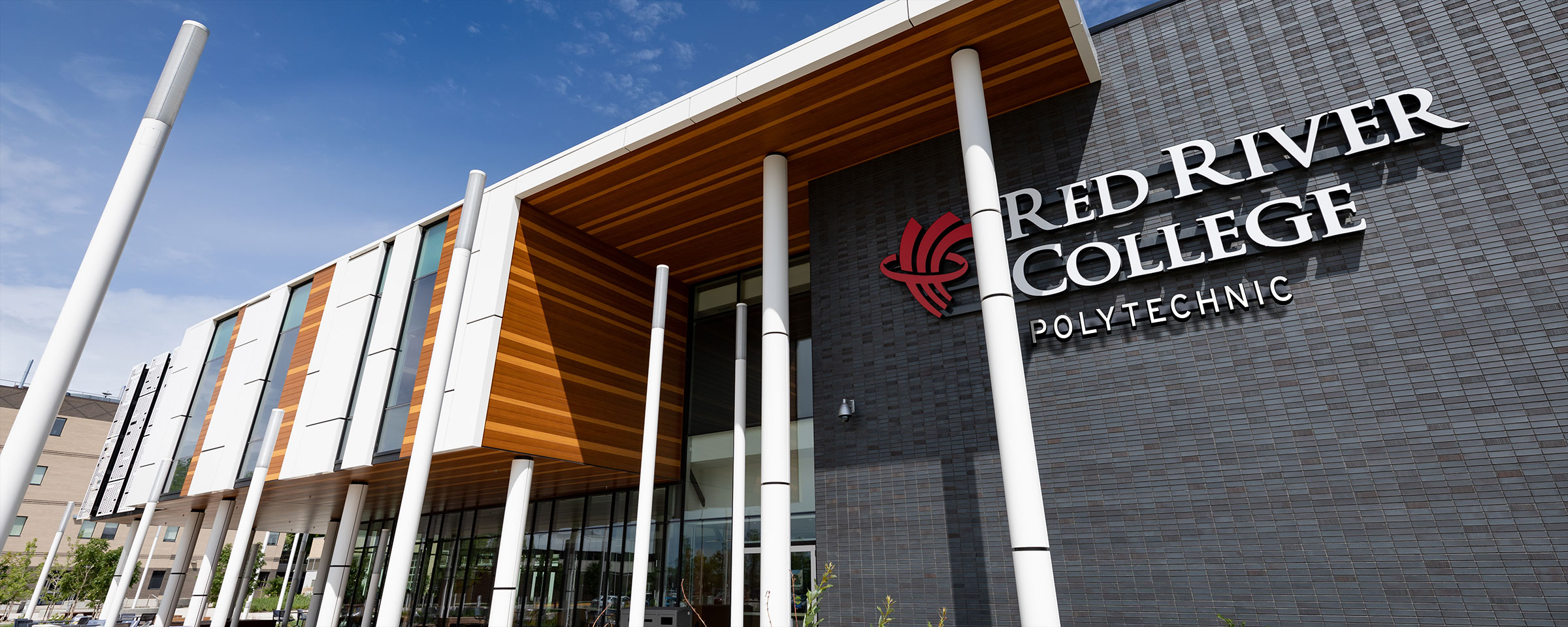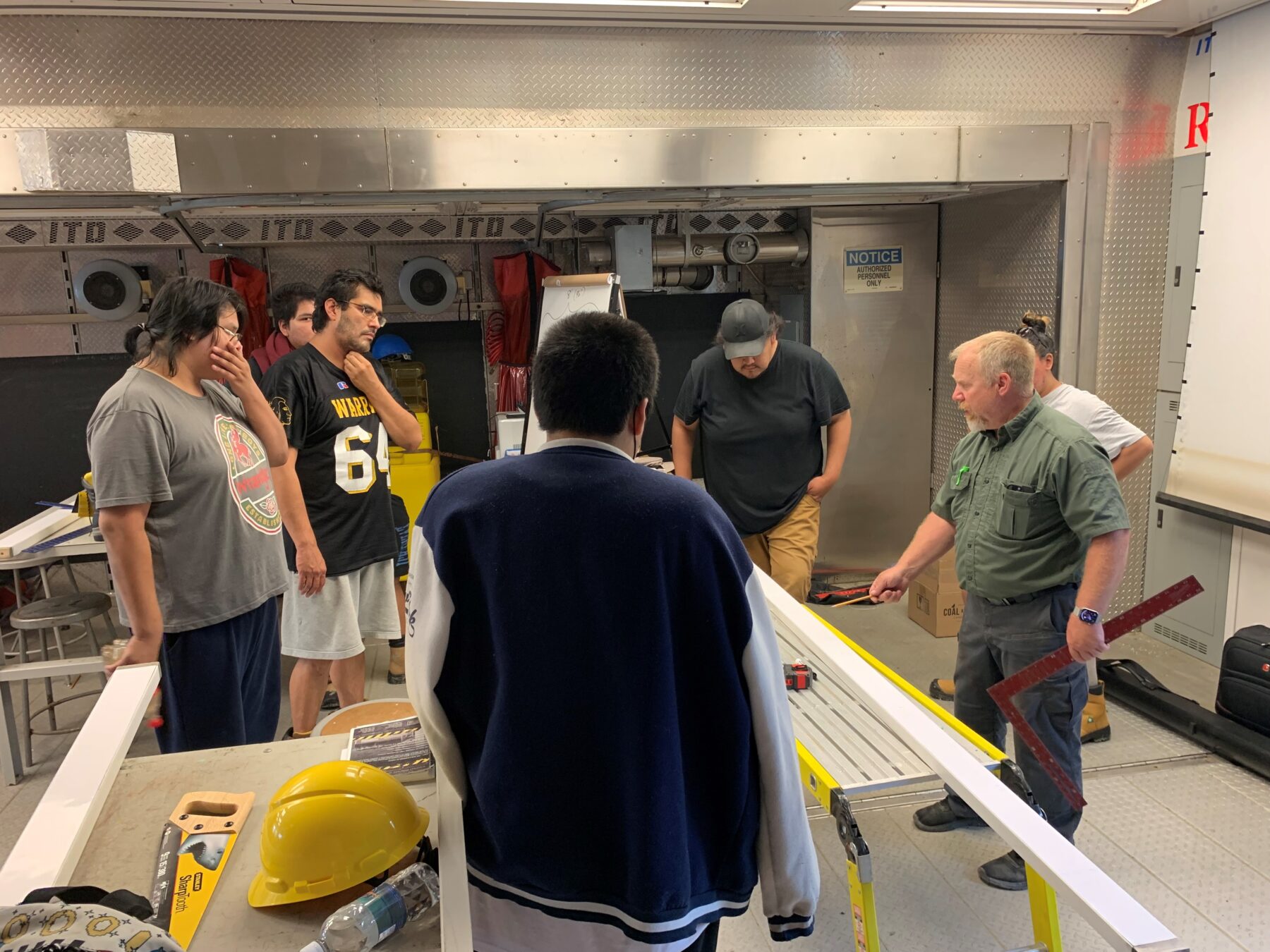RRC Polytech’s Mobile Training Lab helping to build skillsets, structures and relationships in Shoal Lake 40 First Nation
Partnership brings fully funded construction trades training into community to strengthen local workforce and remove barriers for Indigenous learners
Winnipeg, MB on Treaty No. 1 Territory and the National Homeland of the Red River Métis – RRC Polytech is utilizing a mobile facility in community to deliver fully funded construction trades training to Shoal Lake 40 citizens this summer in a growing partnership with Shoal Lake 40 First Nation and Niiwin Wendaanimok, a Kenora-based Indigenous training organization. This collaborative effort aims to strengthen the local workforce and help shrink labour gaps as Shoal Lake 40 navigates record growth featuring numerous new building projects including a water extension project.
It’s the first time that RRC Polytech has deployed a mobile training lab (MTL) to Shoal Lake 40. A dozen eager learners are taking advantage of the opportunity to learn about the tools and equipment, basic measurements and safety standards that will qualify them to seek immediate work as part of a construction crew, in community or beyond.
“One of the greatest barriers that many Indigenous learners face is access to education without being displaced from their support systems,” says Jamie Wilson, Vice President of Indigenous Strategy, Research and Business Development at RRC Polytech.
“RRC Polytech’s mobile training labs and our ability to customize course material with micro-credentials ensures that students can stay close to home and connected to family and tradition throughout their academic journey as they acquire new skills to make a positive impact in their communities.”

The project is being fully funded by Niiwin Wendaanimok via the Skills Development Fund offered through the Ministry of Labour, Immigration, Training and Skills Development (MLITSD). The Niiwin Wendaanimok (Four Winds) Partnership is an Indigenous owned and operated corporation dedicated to providing construction, contracting and environmental monitoring services in Treaty 3 territory with a mandate to employ Anishinaabe workers and assets in development projects and ensure Anishinaabe laws and voices are respected.
“At Niiwin Wendaanimok, our mission is to rebuild the economies of our four partner First Nations while following Manito Aki Inakonigaawin (MAI), the Great Earth Law of the Anishinaabeg. This journey begins with providing comprehensive training programs to our people,” says George Kakeway, Chairman of the Board, Niiwin Wendaanimok.
“The RRC Polytech training program in Shoal Lake 40 exemplifies our commitment, equipping members with the skills they need to meaningfully participate in projects in the community and beyond, including the vital highway twinning project. Through these partnerships, we hope to build a sustainable future for our people, where honouring tradition and progress walk side by side.”


Shoal Lake 40 has over a dozen new home builds underway as well as a number of larger commercial builds on the horizon so there is a local need for general labourers in construction.
“Training local community members in our community is vitally important to our collective strength and pride,” says Chief Kevin Redsky, Shoal Lake 40 First Nation. “Shoal Lake 40 First Nation is catching up from 100 years of isolation since the completion of Freedom Road in 2019 and we are very happy that our local community members are gaining the skills needed from the Red River College Polytechnic Mobile Training Lab to help rebuild our Nation.”
Students began their initial 13-week learning journey earning micro-credentials in safety standards and awareness, tool and equipment use and care, and construction-related measurement and math. They are currently being introduced to the concepts and techniques of basic plumbing and piping and recently completed a two-week course on wood framing that led to the construction of ice fishing shacks that will be shared with the community.

On Monday, they even got a chance to show off their work and share their experiences with a tour of special guests including His Worship, Scott Gillingham, Mayor of the City of Winnipeg and the Honourable Ian Bushie, Minister of Municipal and Northern Relations, who were in community for an annual meeting.
“The ice fishing shack is looking pretty good, so I’m proud of everyone’s work and how much they’ve learned,” said student, Rowen Sky, who is currently working as a framer for a company based in Richer, MB. He’s using the training as, “a good refresher that gives me more time with our young family.”
“We’ve always built things ourselves, but now we’ll know how to build them right so things around here will last longer and be safer for our kids,” added his partner and fellow student, Kendra Green.
The program gives students flexibility in their learning with entry and exit points that can lead directly to employment opportunities in their own community. Students also get a chance to become more comfortable in their new roles by touring current job sites and meeting with sub-contractors and potential employers.
“In addition to building new physical structures and stronger communities, these students are also learning to build relationships that can help them to achieve their goals and dreams while becoming positive role models within their community,” says Wilson. “We look forward to continuing to grow this partnership with Shoal Lake 40 and are committed to supporting all Indigenous communities across Manitoba.”




RRC Polytech has previously supported youth entrepreneurs from Harvey Redsky Memorial School in launching a for-profit business that will generate revenue and bring attention to Shoal Lake 40 First Nation’s legacy from tragedy to opportunity in their generation.
RRC Polytech purchased decals designed by the student-entrepreneurs through a Future Business Leaders Project that will be placed near re-fillable bottle stations on campus. The decals provide information about Shoal Lake 40 providing clean drinking water to City of Winnipeg residents and promote our shared and sacred responsibility to protect the environment. (Learn more)
About Mobile Training Labs (MTLs):
The MTLs are 53-foot-long semi-trailers with slide-out sides that can quickly transform into 950 square feet of vocational training space bringing a classroom, any necessary equipment and professional instruction directly into rural communities.
About micro-credentials:
Micro-credentials are shareable endorsements of knowledge, skills or competencies gained through the completion of a course, a module or demonstration of understanding and are often represented by digital badges. They can also be stacked as learners build their knowledge base and this allows course content to be adapted to meet the specific needs of the students and the community.


